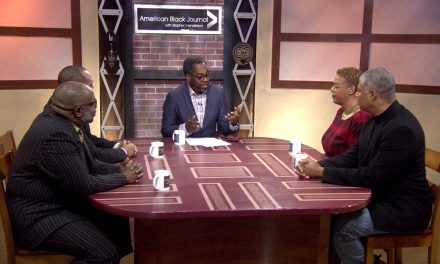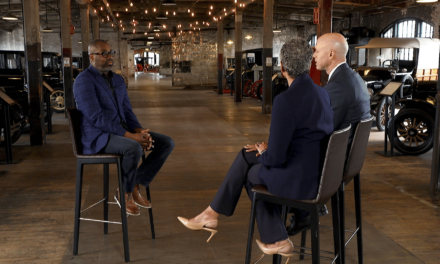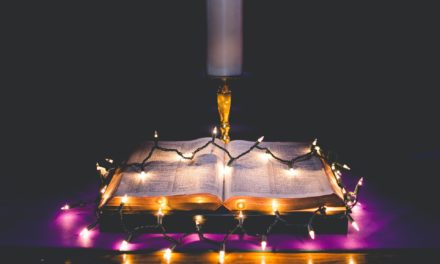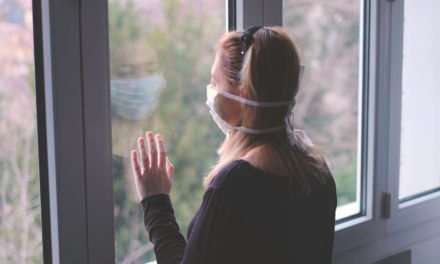From providing online and outdoor services to offering electronic giving methods and making food deliveries to those in need, Detroit’s Black churches have re-examined and re-imagined their ministries and outreach over the past two years of the pandemic. Although online worship has become the norm for many folks, and it may stay that way, a safe return to in-person services is on the horizon some local pastors say.
Host Stephen Henderson sits down with Bishop Charles Ellis III of Greater Grace Temple, Rev. Dr. Steve Bland, Jr. of Liberty Temple Baptist Church, and Pastor Semmeal Thomas of City Covenant Church to talk about the changes to their worship during the COVID-19 pandemic. The pastors share their thoughts about the ability to reach more people through virtual sermons, a safe return to in-person services and the role of technology in church worship as they look to the future.
Full Transcript:
Stephen Henderson: So, Bishop Ellis, let’s start with you. It’s been a long journey. It’s been a very long two years. Everybody has had to change something. Tell us how things are going at Greater Grace as we move into this, I guess, third or fourth stage of the pandemic and more things are possible than they were before.
Bishop Charles H. Ellis III, Greater Grace Temple: I guess the thing that I’m most proud of, Stephen, thank you for having me, is that we’ve been able to continue ministry and that’s the most important thing, you know, how do you face crisis? How do you go through a pandemic which we have never experienced and still continue ministry?
And of course, maybe we were shut down for maybe April and May, Father’s Day 2020. We started outdoor services and we just went indoors last November, the first Sunday. And we’ve continued and things seem to be pretty safe and people are getting along well. So I’m thankful that we’ve been able to continue ministry in the midst of the pandemic. And probably the biggest thing we’re doing now is making sure that we have options not just for television or tape delay, but live options for live service. That means we’re having service live and we’re being able to share it live as well.
Stephen Henderson: When did you go back to in-person in the church? People coming back and getting together.
Bishop Charles H. Ellis III: First Sunday, November 2021. So we were outside for maybe, I don’t know, about 18 months thereabout.
Stephen Henderson: Wow. Wow.
Bishop Charles H. Ellis III: The winter, over the winter, Stephen.
Stephen Henderson: That’s outside in the winter.
Bishop Charles H. Ellis III: I was not inside on a screen outside.
Stephen Henderson: Reverend Bland, tell us how things are going at your church.
Rev. Dr. Steve Bland, Jr., Liberty Temple Baptist Church: Well Liberty Temple as Bishop Ellis said, had to make the adjustments and adaptations but by the grace of God, we are thriving and going forward. Similarly, March 22nd was our last day of worship 2020. So we just hit the two-year mark just a couple of days ago that we vacated at least our sanctuary as far as in-person worship.
But as I said to so many people if the church didn’t close we would just redeploy. So we had the church and engaging new mechanisms and of course, the virtual reality pushed most of us beyond what we were already doing and some were not doing anything much at all. So now it’s a commonplace notion that if you’re doing church period, you have to have some form of virtual presence.
And so people are moving with the balance of theology and technology now is proficiency. So we’re getting technicians and sound and video engineers like we used to get musicians and choir directors and things of that nature. So that has been a common reality.
Rev. Dr. Steve Bland, Jr.: We went back slowly. We took our time. We did a lot of surveying, a lot of praying, and we did a lot of the options, as Bishop Ellis was saying, outdoor other things of that nature. But we put people’s safety first and we continued to make sure that we were in compliance with whatever the state officials and the CDC guidelines and others.
We were in touch with that. Counsel baptist pastors never stop meeting. We met weekly but on virtual platforms to talk about the science. Met with all of the health professionals. What we decided to do after the last year, we a month before Bishop Ellis in October, we decided to go back to the old Southern roots of first and third.
So, you know, in a Southern reality, they would go to church on first and third because they didn’t have enough pastors to cover churches. So we did first Sunday for communion where people could come and gather together. And then third Sunday was our specialty Sunday. So in November, that would be Thanksgiving service. In December that would be Christmas service. January, that would be Martin Luther King service. February, that was Black History Month.
Rev. Dr. Steve Bland, Jr.: So we used that as our specialty service to get people used to coming back. And next month, in April, the first Sunday in April, we will begin to do every Sunday. So we will have first Sunday Communion, Palm Sunday, the second Sunday, and Easter Sunday and just continue from that. So its been strategic and planned and so far people have adapted to it quite well.
We will still do the masking, the social distancing and take serious that health is primary, health is first. But all of our churches in the council have had different kinds of approaches. But the one thing we have done is put faith over fear.
Stephen Henderson: Yeah, that’s amazing. So moving to think of April being the first month that you go back to every Sunday, and you know how important, of course, that church that month is in…
Rev. Dr. Steve Bland, Jr.: Yes.
Stephen Henderson: … The Christian faith, that’s pretty that’s pretty remarkable. Reverend Thomas, tell us what’s going on in your world.
Pastor Semmeal Thomas, City Covenant Church: Well, things have been going well. We’ve been open all 2021. Most people have voted with their feet on whether or not they would come or not. Probably having about 30% of our congregation that would come in person and then the remainder watching over Facebook Live. It has really been interesting.
It is focused. It has forced us to examine the church outside of the box. All right, Brightmoore, I’d like to tell people we were pre-pandemic. And so for us, a lot of the ills that other folks were coming out common to, we were already dealing with. So it’s kind of like we already had some things already in place.
I guess the biggest thing that we were able to accomplish and the thing I’m most glad about is we kept our feeding ministry open and we just shifted the way we did it. And so previously it was closer to like a community kitchen, soup kitchen type situation where people would come in, sit down and eat. And we were looking at how we could still do that. So we moved to a carry-out format.
Pastor Semmeal Thomas: And in the midst of that, a guy called me and the guy said, Pastor, I’ve got COVID, and my family won’t come near me and I need food. And so he said, can you bring me some food? So we were like, yeah, we can bring you some food. And of course we were concerned like everyone else, and we brought it to his door and called him. And then I went back to the office and I thought about how many more people are like him.
How many more people are out there. And, you know, people don’t like to say the term, especially in Christianity, that we were afraid, but many people were afraid, and that’s just the truth. Alright, and so we decided to change our motto to delivery.
So now we deliver about 150 meals per day, four days out of the week. Right to our seniors, our unhoused, to our poor population within a four-mile radius of our church. And it’s interesting because prior to COVID, I would have never thought of delivering the food. So it’s almost like we’re free DoorDash.
Stephen Henderson: Yeah.
Pastor Semmeal Thomas: It is caused us just to reexamine ministry and the ways that we can effectively serve the body of Christ and beyond.
Stephen Henderson: Yeah. So I wanted to spend a little time talking about how everything that’s happened over the next two years kind of permanently changes some of the ways that we think about church and ministry and I guess some of the needs. I mean, Reverend Thomas talking about this profound need to feed people on the outside of the church.
Stephen Henderson: I would imagine that all of you are experiencing, you know, a revelation of needs that your congregations have that maybe we weren’t so focused on before. So bishop Ellis, again, I’ll start with you. Let me know what is permanently altered, I guess, by all of this.
Bishop Charles H. Ellis III: Well, let me say that. Let me deal with spiritual, spiritual food. And then I’ll let some of them deal with natural food and those things. There was a time we always had a captive audience at church, you know, so we could go for 2 hours. We go for 3 hours. You know, nobody’s going to walk out, you know, nobody wants to walk out. You know, it’s almost sacrilegious to walk out of church. You know what I’m saying?
Bishop Charles H. Ellis III: While the ministry is going on or while the offerings going on or while the music ministry is going on, certainly the preach word. But now I’ve realized that we don’t have a captive audience. You know, if people don’t like what I’m saying, it has taken me too long to get to the point, whatever. You know, they’ve walked out of church virtually, you know what I’m saying.
Bishop Charles H. Ellis III: And they’ve gone to somebody else’s church. They could be over in Australia or whatever the case is because everything is virtual now in that virtual space, I should say. So that has changed me forever, Steve. I mean, I’m making sure that my message from beginning to end because for so long, you know, we all have built little bells and whistles and a little fluff in there, here and there. But now I make sure that my message is from beginning to end.
Bishop Charles H. Ellis III: You know, I’m at the point I’m sticking with. I’m getting to the point, you know, I’m not saying anymore. I’m not going to keep you long because when the preacher says that you better get a nap. You better get those. Stephen, now I’m not saying anything. I’m getting right to my text, getting right to building that message, hitting the main point and bringing the doxology, you know.
Bishop Charles H. Ellis III: So that has changed for me because you can see and I have people monitoring, you know, when those numbers are up on Facebook and those social media platforms and when those numbers go down, you know, and the numbers come up when I get ready to preach you know what I’m saying and then when I’m done I’m getting ready to receive the offerings and doing the announcements and all that the numbers go down.
Bishop Charles H. Ellis III: So I’m saying, hey, I got to get the going with what I’m going to do in presenting my message. So my whole ministry presentation, it has changed and I think it’s changed forever. So that’s the spiritual food, you know, I’m trying to get them fed and not talk about the menu and not talking about here’s the special of the day, you know, because you’ve been sitting in the restaurant you’re like hey, man listen, I come here all the time.
Bishop Charles H. Ellis III: I know what I want to eat. Can you just take my order? I don’t want water. I don’t want no appetizer. I want a steak and some potatoes and some spinach and let’s move on down the road. So that has changed me forever in terms of my ministry presentation. So I’ll leave that as spiritual food has changed for me in serving the people.
Stephen Henderson: Yeah. Yeah. Reverend Bland, tell me what’s different about the way that you minister in your church now.
Rev. Dr. Steve Bland, Jr.: Well, I think a lot has changed in the post-COVID-19 culture has shifted how we think about, I think, church and its full dynamic. Our delivery systems, of course, are different in terms of making sure that those platforms increase. I’m pleasantly surprised to be able to know that we are able to quantitatively reach more people, I think, through the platforms, we have now than we were before.
So I think that most of us realized that while we were in some sense of fear and trepidation of not being in church our platforms now we’re starting to connect with people that we weren’t reaching, that weren’t coming into our building. And so we have to permanently plan with them in mind.
So that when we do that worship platform, our Christian education platform, the way we do evangelism, the way we do just about everything needs to be mindful that we are in a global mentality, that we are actually moving and speaking to people. So some things we normally even would say would deal with that was internalized to our local fellowship needs to now be dealt with so that we are speaking to people and speaking life to people beyond the reach that we once had.
Rev. Dr. Steve Bland, Jr.: Similar to Pastor Thomas, our ability to become mobile and our delivery systems, people would come to the church to get things often and things of that nature. And now the church has had to get beyond its four walls, realize we were always the salt of the earth and the light of the world, not the salt of the church in the light of our members.
So, you know, we’ve had to get to where they are. So we’ve had to increase tremendously the export of how we help people to help people. And I think that has been a real open learning lesson. And then, you know, we are a culture that likes to hug and shake hands and, you know, do things of that nature.
And it was also difficult, you know, because most of us in our sermons, we tell them, you know, people get in a high five and a fist bump and this, that and the other. But we had to be mindful of making sure we weren’t doing things that could cause people any fears, trepidation or harms.
Rev. Dr. Steve Bland, Jr.: Even when it came to the disciplines of communion or baptism, things that are sacred to the church, we had to rethink everything and begin to know what types of things now must we deal with that can change and what things must we begin to adapt? So again, our principles, we are holding fast to our practices.
Everything is up for examination so that we might be practical, particularly to reach a new age. But again, that’s what we should be doing. We should be discerning the times and have wisdom for the present age.
Stephen Henderson: So, Reverend Thomas, your church is in an area of the city that, as you point out, was hard hit before the pandemic. I know that the pandemic was also more brutal, is really the way to put it on parts of the city than others. And I know that Brightmoore has really, really suffered through it. So I wonder, given all of that, what’s different what’s permanently different in your church and in your ministry?
Pastor Semmeal Thomas: Dr. Bland really touched on a number of things. It was interesting, we did Facebook prior to the pandemic, but honestly, we did it for members who couldn’t make it to church. All right. Never really thinking beyond what a tremendous evangelistic tool that it is. So now my sister watches me from South Carolina. My brothers in Tampa, Florida, watching me. All right.
And I never. I was convicted. I mean, I never thought about using that medium to reach folks. And it is the new highway and byway. All right. And so our children and our grandchildren are online constantly. And very similar to the educational system. You know, we sucked at it. We just were not looking at it.
Pastor Semmeal Thomas: You would think that we would have things to prepare for online learning. All right. Because our kids are used to screen time. Are they not like us? You know, we wanted to go out and play when we were kids. But our kids, my granddaughter, she wanted a tablet for her birthday. Six-year-old child, that’s what she wanted, a tablet.
And so I think that’s probably the most— I think that the biggest thing that I will hold on to going forward. I’ve been kind of stubborn. I have really kind of resisted. I’m a learn from Bishop, all right that you know, I pretty much still preach the same way. All right, I am concerned about.. conforming. Just my personal concern not about others. All right. And so, of course, you have to cut the time because he is right. The numbers go up at a certain point and they come down.
Stephen Henderson: And they can come down.
Pastor Semmeal Thomas: Right. But then I also realize that there are people that are watching Sunday service now on Wednesday.
There are people who will come in on Sunday service because, you know, when you look at the algorithms, they look at all the different things there are people that watch me at 6:00 o’clock on Sunday instead of at 10:30 in the morning. All right. You know, and so just been trying to be disciplined about being who and what God has called me to be and serving who he’s called me to serve.
All right. And so and embracing this change. And you know, there’s another challenge in the dynamic for us because we’re a smaller church, and I hate to put it this way, but we’re a poor church. We’re in a poor community.
Stephen Henderson: Sure.
Pastor Semmeal Thomas: And so I don’t have any engineers. Okay. All right. And so really finding young people and empowering them has been another great dynamic of this that, you know, my engineer is like 14 and I’m like, hey man, get the Facebook up going.
Stephen Henderson: Help me get this online.
Pastor Semmeal Thomas: So God has been good. I really have enjoyed this season actually.
Stephen Henderson: Yeah. Yeah. Okay, great to have all three of you here. And it’s so wonderful to hear about the way that the Black church just persists. Right. It survives everything.
Rev. Dr. Steve Bland, Jr.: Resilient.
Stephen Henderson: It has survived everything. And what you guys are talking about is just the latest iteration and chapter in that centuries-long narrative. So thanks very much for being here with us on American Black Journal.
Rev. Dr. Steve Bland, Jr.: Thank you, Stephen. Blessing to you and your family.
Stay Connected:
Subscribe to Detroit Public Television’s YouTube Channel & Don’t miss American Black Journal on Tuesday at 7:30 p.m and Sunday at 9:30 a.m. on Detroit Public TV, WTVS-Channel 56.
Catch the daily conversations on our website, Facebook, Twitter and Instagram @amblackjournal.
View Past Episodes >
Watch American Black Journal on Tuesday at 7:30 p.m. and Sunday at 9:30 a.m. on Detroit Public TV, WTVS-Channel 56.




